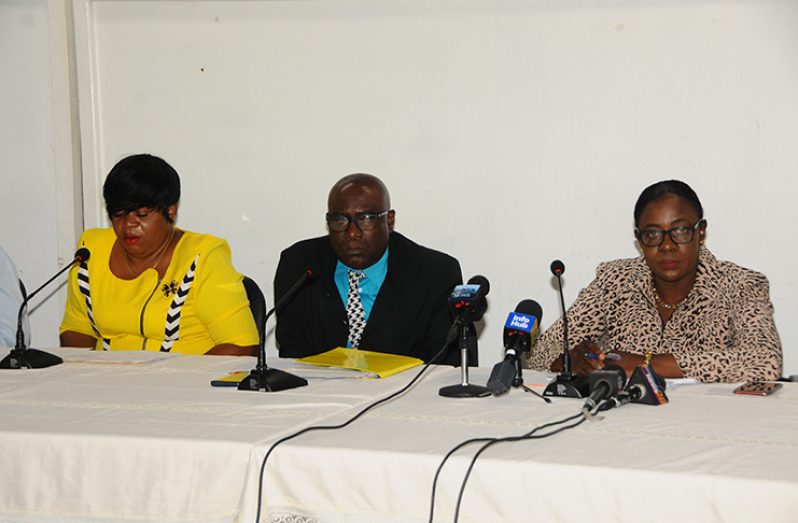…34 out of 1000 schools closed
– Ministry to deploy 2,500 substitutes soon
JUST around 10% of public school teachers participated in strike action by the Guyana Teacher’s Union on Monday and about 34 of the some 1000 schools were closed, the Ministry of Education said on Monday.
The Ministry of Education (MOE) has a complement of 10,615 teachers, but only 1,065 took part in the strike action on Monday and absented themselves from school. According to the breakdown given by the ministry of teachers who were absent are: Region 1, 33; Region 2, 21; Region 3, 43; Region 4, 34; Region 5 (to be tallied); Region 6, 276; Region 7, (to be tallied); Region 8, 3; Region 9, 36; Region 10, 400; and Georgetown, 219.
Despite their absence, the ministry said it was able to account for 90 per cent of its staff complement by recruiting volunteers which included students of the Cyril Potter College of Education (CPCE) and retirees.
This was according to a senior official of the MoE, Marcia Paddy, who also added that most schools were opened on Monday despite the nationwide strike. According to a breakdown of the information which was provided by the ministry, just five schools out of 47 were closed in Region One (Barima-Waini); all schools in Region Two (Pomeroon-Supenaam) were opened; all were also opened in Region Three (Essequibo Islands-West Demerara); all 132 schools were opened in Region Four (Demerara-Mahaica); 2 out of 75 schools were closed in Region Five (Mahaica-Berbice); 3 out of 142 were closed in Region Six (East Berbice-Corentyne); 1 out of 35 schools was closed in Region Seven (Cuyuni-Mazaruni); all schools were opened in Region Eight (Potaro-Siparuni); 12 out of 83 schools were closed in Region Nine (Upper Takutu-Upper Essequibo); 11 out of 60 schools were closed in Region Ten (Upper Demerara-Berbice); and all 91 schools in Georgetown were opened.
“When we say all those schools were opened, we mean that all the doors of the schools were open and the learners could access anything from the school,” said Paddy at a press briefing on Monday evening. Prior to the commencement of the strike, the ministry had already established a contingency plan which allowed them to fill the void and even gave them the opportunity to make provisions for the schools which were closed.
“We have a database and based on the need, we will adjust the figures of the substitutes,” said Chief Education Officer (CEO), Marcel Hutson. As part of the contingency, an advertisement, which solicited volunteers, was issued by the ministry.
Although only 32 persons have responded to the advertisement, Hutson believes that the trainees from CPCE and retirees were able to compensate for the shortfall. “This is a work in progress… we have people who would be willing to offer their service… in fact there are a number of applications that keep coming in,” he said, adding that the situation is not one which could be fixed immediately but the ministry is on its way to bringing relief to the children.
Minister of Education Nicolette Henry said testimony to the relief is the number of applications that are with the Teaching Service Commission (TSC) and the ministry. Though the TSC is yet to provide a list of persons who have met the requirements, they have already gathered 2,500 persons, including trainees, retirees and volunteers, who will be deployed soon.
The cost of the venture is still being worked out but the ministry believes that the contingency plan will work. “When you are operating under a situation which is not normal and which creates additional tasking, it will put a strain on any system,” said the minister, adding that it is, however, their duty to ensure that every child is in the classroom during the academic year. The ministry intends on ensuring that regional education officers monitor the situation so that they would be able to make informed decisions going forward.












